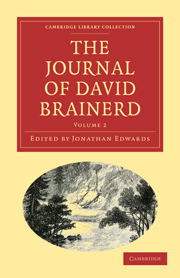Book contents
I - A Dialogue between the Various Powers and Affections of the Pious Mind
Published online by Cambridge University Press: 05 July 2011
Summary
1. TheUnderstanding introduced, (1) As discovering its own excellency, and capacity of enjoying the most sublime pleasure and happiness. (2) As observing its desire equal to its capacity, and incapable of being satisfied with anything that will not fill it in the utmost extent of its exercise. (3) As finding itself dependent, not self-sufficient; and consequently unable to spin happiness (as the spider spins its web) out of its own bowels. This self-sufficiency observed to be the property and prerogative of God alone, and not belonging to any created being. (4) As in vain seeking sublime pleasure, satisfaction, and happiness adequate to its nature, amongst created beings. The search and knowledge of the truth in the natural world allowed indeed to be refreshing to the mind, but still failing to afford complete happiness. (5) As discovering the excellency and glory of God, that He is the fountain of goodness and well-spring of happiness, and every way fit to answer the enlarged desires and cravings of our immortal souls.
2. The Will introduced, as necessarily yet freely choosing this God for its supreme happiness and only portion, fully complying with the dictates of the understanding, acquiescing in God as the best good, His will as the best rule for intelligent creatures, and rejoicing that He is in every respect just what He is; and withal choosing and delighting to be a dependent creature, always subject to this God, not aspiring after self-sufficiency and supremacy, but acquiescing in the contrary.
- Type
- Chapter
- Information
- The Journal of David Brainerd , pp. 259 - 268Publisher: Cambridge University PressPrint publication year: 2010First published in: 1802

